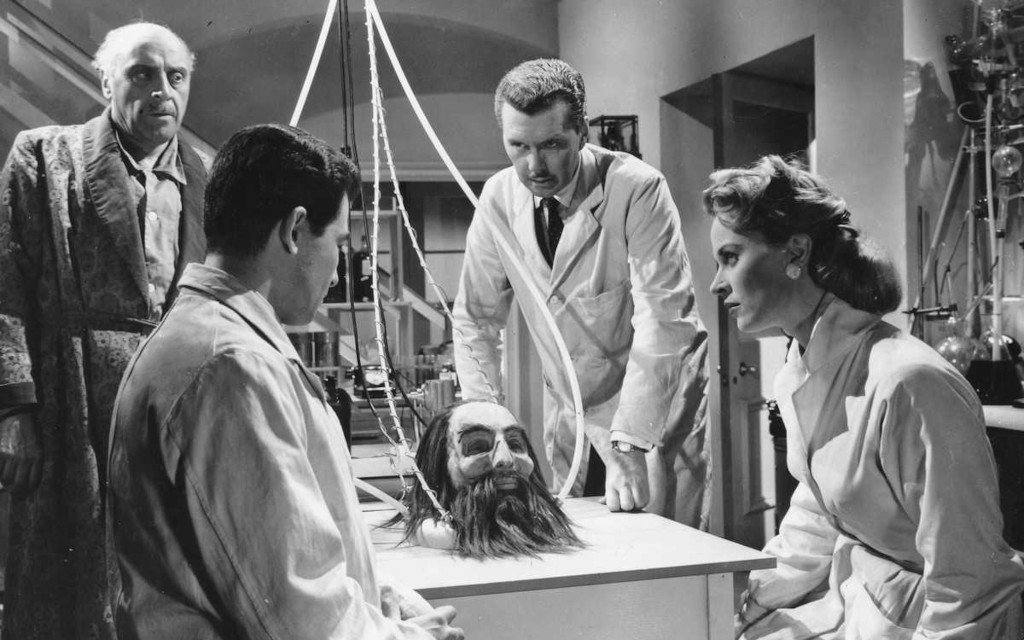
The Man Without A Body (1957)
“You think fast, Nostradamus, but I won’t change my mind!”
Karl Brussard (George Colouris) is a very angry man, with a pathological hatred of telephones. When he’s not ripping them out of the wall and throwing them on the ground, he’s accusing them of ringing when they’re clearly not.
He’s a fitness nut (apparently, although I’m not entirely sure Colouris’ be-vested physique backs that up), and will need some decent stamina to get through this film, which is another “let’s see how much we can cram into a very short running time” extravaganza. There’s a certain breakneck charm to the opening scenes, as we learn that he doesn’t like his demanding French ward very much (preferring to get a massage than deal with her exhortations that she’s going to cut her wrists re his phone destruction while she’s trying to book a haircut), he’s a very successful businessman (“I built an empire out of nothing, and this is the brain that did it!” he says, admiring x-rays of his skull), and he is dying from a brain tumour (hence the x-rays).
The good news is that but a stone’s throw away, there’s a doctor experimenting in brain transplants. Brussard hot-Rolls-Royces it over to the doctor’s suspiciously cheap-looking London practice (no gothic castles for this mad genius), where he finds an assortment of disgusting-looking brains in jars, an eyeball moving around by itself and a living monkey’s head attached to a pump.
Doctor Merritt (Robert Hutton) and his well-meaning team of monkey-abusers (hey, it was the 50s) hook Brussard up to a scan, as he merrily puffs on a cigarette while they hide behind a radiation-proof curtain of some kind.
Brussard is then told that the living monkey head had actually been dead six years before it was restored (erm…) and he decides that this is the way forward… he’ll simply find another brain to insert into his head! (me neither).
Meanwhile, in a separate-but-important plot advance, Brussard’s ward Odette (Nadja Regin) has hooked up with Merritt’s dishy lab assistant.
Just in case things weren’t nuts enough, the whole plot now takes a turn for the utterly bonkers.
An impromptu (and long-winded, within the context of this short film) visit to Madame Tussaud’s waxworks puts the idea in Brussard’s head that only the brain of Nostradamus will do for his body when his own brain is gone (Nostradamus’ dummy being played, of course, by a real person who will later make another appearance).
“Where is he buried this Nostradamus?” he asks, to which the answer is a noncommittal “In France, I think.”
So, the whole of France being easy enough to search, Brussard seeks out the drunkest doctor he can find and packs him off to retrieve Nostradamus’s head, because as we all know, when you need a famous 400-year-old head collecting from a tomb, only a really pissed-up medical practitioner will do.
To cut a short story slightly shorter, the experiment works and in the laboratory, Nostradamus’ head starts to breathe. For some reason (perhaps it’s the stroke he’s just had), Brussard then changes his mind and decides to destroy the head, but the head wakes up properly… and starts to speak. In English, of course.
As Dr Merritt and his team talk shop with Nostradamus, who seems pretty switched on for a head that has been rotting for 400 years (and, one assumes, was embalmed shortly after death), Odette (remember her?) makes plans with the lab assistant to bring a bit of assisted dying into the mix, Brussard-wise.
Apropos of absolutely nothing, Brussard then decides to take business advice from the head and promptly loses all his money. It turns out that Nostradamus doesn’t much like his angry resurrector (can’t think why) and this is all a plot to show him who’s boss (or something).
Brussard goes mad, strangles Odette, shoots her lover, shoots the head, and goes on the lam. But somehow things take a turn for the even crazier, and the next thing we know, there’s a bizarre-looking Frankendamus monster looking for Brussard. How will it all end? Well, badly of course. But it’ll be fun to find out exactly how badly.
Quite how this film ever even got made is a mystery. It plays out like someone wrote a load of ideas from other films on bits of paper and then put them together by fishing them out of a bucket. Not one part of it makes any sense at all, each character’s motivation to do what they do is baffling, and most of them seem to change halfway through (witness Dr Merritt’s other assistant, Jean (Julia Arnall), who someone remembers halfway through is clearly supposed to be the glamorous love interest, so she shifts gears quite spectacularly).
Is it any good? Nope. Is it worth watching? Well, I’d say yes. Come for the nonsense, stay for a “monster” that is so utterly absurd it’s a work of genius.
